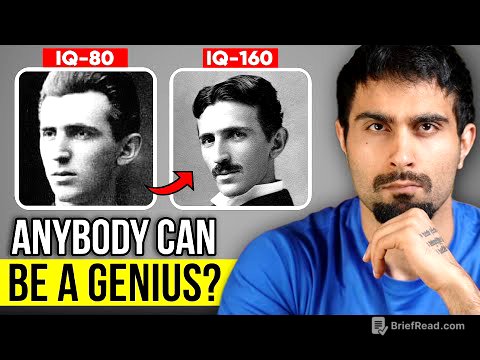TLDR;
James Fallon discusses his journey of self-discovery, which began with uncovering his true name and ancestry, and took a surprising turn when he discovered he had the brain and genetic markers of a psychopath. Despite these findings, he had a normal life due to a nurturing upbringing. He explores the implications of his psychopathic traits on leadership and society, and the potential for reversing epigenetic changes. He concludes by discussing the future of human evolution and the importance of a stable information society.
- Fallon initially identified as a normal individual with a stable family and professional life, only to discover he had psychopathic traits.
- His nurturing upbringing mitigated the negative effects of his genetic predispositions.
- Fallon explores the role of psychopathic traits in leadership and the potential for reversing epigenetic changes.
Introduction [0:09]
James Fallon introduces himself as a white heterosexual male with a mixed Irish, Sicilian, and English heritage. He recounts discovering in his youth that his given name was not his birth name and that he was of English descent rather than Irish due to being adopted. He describes his upbringing as fairly standard, involving being a class clown, being named Catholic Boy of the Year, and participating in extreme sports. He has been married since Nixon and has a stable family life with three children and five grandchildren. He retired from administrative work at U.C. Irvine at 62 but continues to teach and conduct research.
The Discovery of Psychopathic Traits [3:16]
Fallon explains how his research into PET scans of murderers led to a surprising discovery about himself. He was studying brain scans to identify patterns in psychopaths, specifically looking at the limbic system, which is associated with social and emotional regulation. While conducting research on Alzheimer's genetics, he used himself as a control and discovered that his own PET scan resembled those of the most severe psychopaths. Further genetic testing revealed alleles associated with high violence, low anxiety, and psychopathic empathy.
Ancestral History and the TED Talk [7:19]
Fallon's mother revealed a book detailing his family history, which included a direct ancestor who committed the first matricide in the American colonies. His ancestry also includes connections to Cornell University, Lizzie Borden, Jimmy Carter, and Marilyn Monroe. Further research revealed multiple lines of murderers and slave traders on his father's side, along with a high percentage of ministers and nuns. Fallon was invited to give a TED Talk about adult stem cell biology but instead shared his personal story of discovering his psychopathic traits, which gained significant attention due to the keywords "psychopathic killer."
Clinical Confirmation and Self-Reflection [11:38]
Fallon was invited to Oslo to discuss bipolar disorder, where psychiatrists, after reviewing his genetics and brain patterns, suggested he had bipolar disorder and was close to being a full psychopath. This prompted him to seriously consider his condition and ask his close friends and family for their honest opinions, which confirmed their long-held belief that he exhibited psychopathic traits. He underwent psychoanalysis and testing, which revealed he was a borderline, pro-social psychopath, also known as a successful psychopath.
The Role of Nurture and Personal Change [14:14]
Fallon reflects on why he isn't worse, despite having psychopathic traits and genetics. He attributes it to his nurturing upbringing, which mitigated the negative effects of his "warrior genes." He realized the importance of environment, contrary to his previous beliefs. To address his psychopathic tendencies, he consciously started considering what a "good guy" would do in various situations, which led to positive behavioral changes noticed by his wife and friends, even though his actions were not initially sincere.
Professional Initiatives and Leadership [19:54]
Fallon formed a "global consortium" with colleagues to explore how epigenetics influences behavior and how to convince belligerent groups to avoid creating environments that perpetuate violence. He discusses the role of psychopathic traits in leadership, particularly "fearless dominance," a pro-social trait associated with charisma and leadership qualities. He analyzes various leaders, noting that some psychopathic traits can be powerful but must be balanced with empathy and other positive qualities.
Species-Level Perspective and Future Trajectory [25:07]
Fallon emphasizes that traits should not be viewed as simply good or bad but rather in terms of their impact on the individual, family, and species. He discusses the energy and narcissism required for leadership roles and the importance of addressing violence and abuse in global cultures. He highlights research on nomads and the impact of harsh physical environments on promoting peace. He also mentions ongoing research on human skeletons and DNA to understand the human trajectory.
Epigenetic Reversibility and the Future of Humanity [27:49]
Fallon shares the promising news that epigenetic changes may be reversible, potentially allowing for the "uncoding" of psychopaths and other individuals affected by negative experiences. He concludes by discussing the future of human evolution, envisioning a transhuman world with the integration of synthetic biology and digital technology. He presents a vision of humans evolving into homo cyberneticus, homo optimus, and ultimately homo machinus, while those resistant to these changes may become obsolete. He emphasizes the importance of a stable and nurturing information society to ethically navigate this future.









